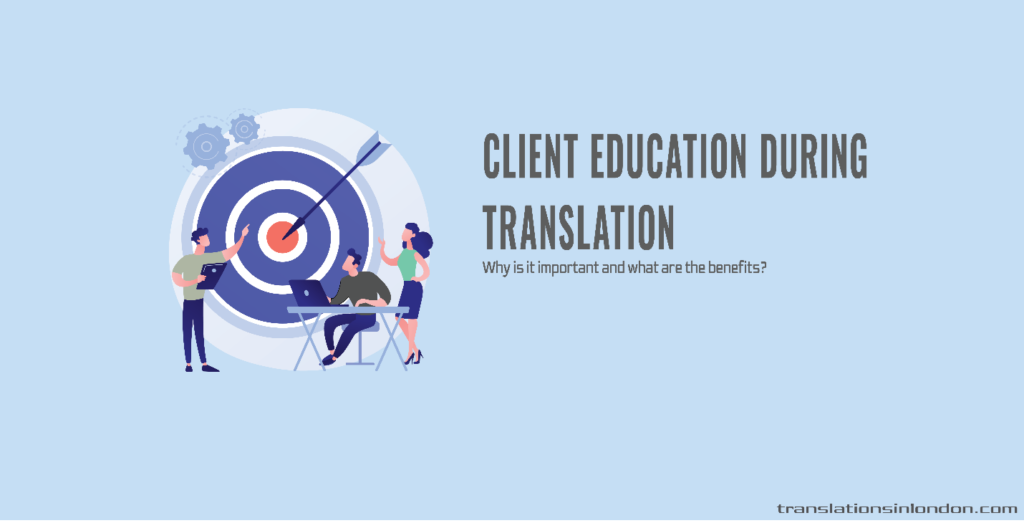A business is only as good as its employees‘ clients.
While the former still holds, we want to make a case for the latter.
Consensus dictates that every business desires a ‘good’ client who is loyal, well-informed, and does not have unrealistic expectations about your products or services.
The above statement also applies to language service providers, and one way they can develop this sort of ideal client is by educating them about the entire translation process. So in this post, we take a look at why client education is crucial during translation and what your company stands to gain by doing so.

What is client education?
Simply put, client education is the practice of providing customers’ resources and information to enhance their understanding of your product and services.
Client education is a small segment of the communication lines, which we have mentioned severally is crucial for translation companies to establish.
Businesses are encouraged to educate their clients on some of the intricacies of their services for many reasons, which we would cover later in this article. For translation companies, they can utilize blog postings, emails, seminars, and the likes to convey relevant information concerning their service to clients.
Why is client education important?
Truth be told, while some clients may have a working understanding of the translation process, others may not. And this could lead to some clients unintentionally downplaying the complexities of the translation process.
For instance, some might think translation only involves plugging in the desired text into a software (machine translator) and proof-reading whatever comes out. They usually fail to account for the expertise it takes to understand several technically sensitive terms, nuances, and contexts. It is also common for them to neglect language diversity (e.g., how languages like Mandarin have many dialects).
For all the clients involved, the lockdown has emphasized the importance of educating our clients. In some industries, it meant to teach them to do our jobs, so they truly appreciate the process and tailor their expectations to realistic levels.
What aspect of translation requires client education?
In the real sense, many segments in translation require education, but in an attempt to keep this write-up brief, we would only cover four stand-out areas, which are;
- Planning: Educating clients about the planning stage, especially when preparing for a translation project, helps smoothen the entire process. The end result is informed clients who know more about what documents they need to provide, how to properly communicate what they want to achieve from the project and the likes. All these put together ends up producing the desired outcome.
- Workflow: An understanding of a translation company’s workflow helps limit the unnecessary back and forth in a translation project. Clients are clearly aware of the stage involved and hence are more considerate with the entire process.
- Specialization: The area of specialization is very crucial in translation. By informing clients of the various niches present, they are now aware of the sensitive areas and what to expect with respect to timelines and the likes.
- Pricing: This is probably the most important consideration for clients when embarking on translation and probably the area which needs the most sensitization. Informing clients about how the complexity, hours spent, delivery interval, and other factors affect the final costs helps them come to terms with whatever the final cost is. Therefore, they can also find creative ways to tailor the project requirements in order to save costs.
What are the benefits of client education?
The perks of educating clients about the translation process are not limited to one party alone, but both sides. The ultimate result is a satisfied client and thoroughly translated or localized project. Here are some of the benefits of educating clients;
- It helps build trust and loyalty, as the clients are more aware of what goes on behind every project.
- By clearly sensitizing the clients about the details behind the process, your business can reduce the time spent offering support and other customer service-related issues.
- If clients are informed about what goes on behind the scenes, it becomes easier to justify the cost of a translation project.
- A well-informed client shows more appreciation for the effort it takes to deliver a project and knows how to control their expectations.
In conclusion, while it is pertinent to educate clients about the translation process, translation companies must know that it is an ongoing activity that needs sustenance.
The ideal client is the one who shows some interest in the translation process, but as much as we would like to choose only ideal clients we need to do our best to advise our clients and recommend some best practices.
TranslationsInLondon strives to guide its clients with actionable information through the entire translation journey to enable you to get the best value out of every penny spent.